| Article ID | Journal | Published Year | Pages | File Type |
|---|---|---|---|---|
| 2012022 | Pharmacological Reports | 2010 | 10 Pages |
Abstract
The aim of this study was to establish the antagonistic effects of 1-methyl-1,2,3,4-tetrahydroisoquinoline (1MeTIQ) on NMDA receptors and its neuroprotective abilities on primary cultures of rat cerebellar granule cells exposed for 30 min to 250 or 100 μM glutamate. Neuronal viability was tested after 24 h with propidium iodide or calcein/ethidium homodimer-1 staining. The neuroprotective potential of 100, 250 or 500 μM 1MeTIQ was compared with established uncompetitive NMDA receptor antagonists, 0.5 Îm MK-801, or 5 μMmemantine. These substances were applied for 30 min either together with glutamate, 24 or 48 h before glutamate, or 0.5 h, 1 h and 3 h after exposure to the excitotoxin. The results demonstrated that MK-801, memantine and 500 μM 1MeTIQ induced an almost complete neuroprotection when co-applied with glutamate, but lower concentrations of 1MeTIQ were slightly less effective. Similar effects for 1MeTIQ and the established NMDA receptor antagonists were observed in the pretreatment experiments, even with a 48-h lag between the application of the tested substances and the excitotoxic challenge. In the post-treatment experiments, MK-801 and memantine and 500 μM 1MeTIQ applied up to 3 h after the exposure to glutamate significantly reduced the excitotoxic lesion, but 1MeTIQ in lower concentrations was ineffective. These results indicate that 1MeTIQ shares neuroprotective abilities with established uncompetitive NMDA receptor antagonists, which suggests that its inhibitory effect on NMDA receptors plays a key role in its anti-excitotoxic activity. Moreover, our data disclose a new mechanism of 1MeTIQ-evoked neuroprotection based on the induction of neuronal tolerance to excitotoxicity.
Keywords
Related Topics
Life Sciences
Biochemistry, Genetics and Molecular Biology
Biochemistry
Authors
Magdalena Kuszczyk, Marta SÅomka, Lucyna Antkiewicz-Michaluk, Elżbieta SaliÅska, Jerzy W. Åazarewicz,
